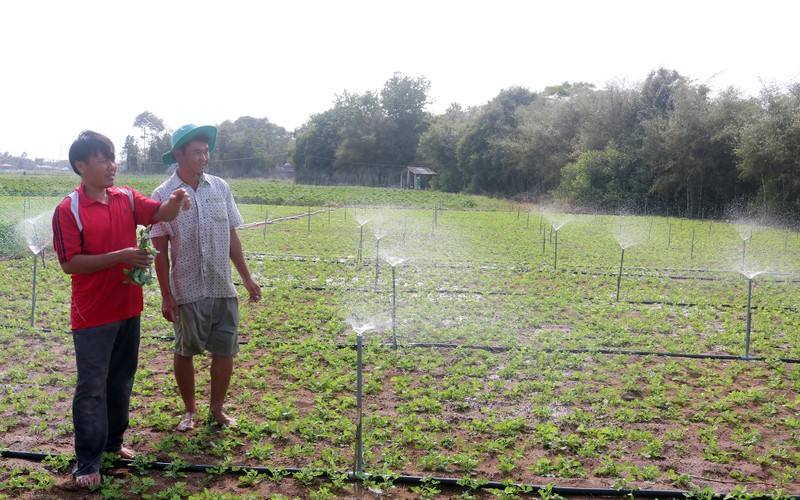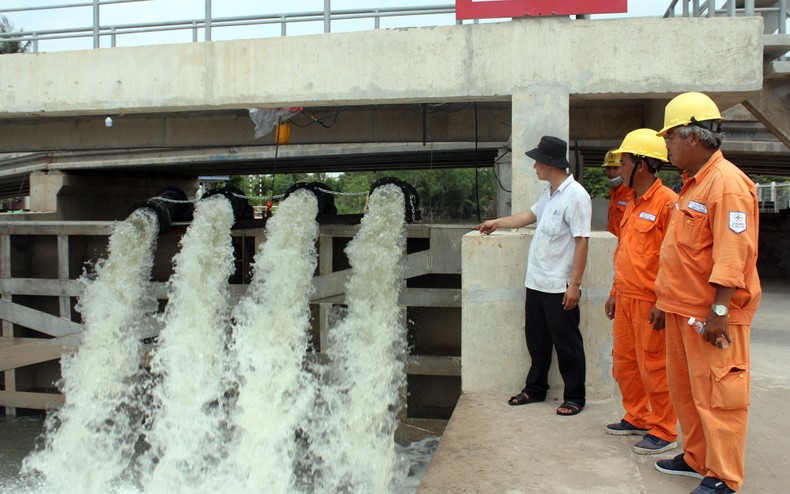
Farmers in Cau Ngang district (Tra Vinh) grow crops on sandy soil and irrigate sparingly from the water source of the Long Son reservoir.
Lesson 1: Gradually adapting to drought and salt
Every year, after the Lunar New Year, drought and salinity begin to take place and directly affect many localities in the Mekong Delta. But thanks to proactive water storage, at the beginning of this year's dry season, the water level in the fields in many places in the Mekong Delta is still very abundant.
Abundant fresh water is a favorable condition for farmers to completely harvest winter-spring rice from 2022-2023, irrigate vegetables and meet people's daily needs in the dry season.
Stored water
Going to the "sweetizing" area of Go Cong (Tien Giang), where drought and salinity often threaten when the dry season comes, there is still a lot of fresh water. This is the effect from the initiative to store water very early in the main canals and in the field in the districts of Cho Gao, Go Cong Tay, Go Cong Dong and Go Cong town. The rice fields that are about to be harvested must be reinforced with additional embankments to prevent water from entering the interior.
Ms. Nguyen Thi Luom from Thanh Nhut commune, Go Cong Tay district (Tien Giang) said: "My family's six rice crops are ripening and still need fresh water for more than 10 days. A few days ago, I listened to the national radio. salinity has increased and penetrated deeply, but in fact, here, the water source in the canals and canals is still quite large, so it is still hoped to "win" this crop.
Champeaux canal in Tan Thanh commune, Go Cong Dong district (Tien Giang) leads fresh water to the sea dyke. This time of the years 2016-2017 and 2019-2020, the water flow has dried up. This year, the water level in the canal is still quite high, filling the fields.
Taking advantage of fresh water storage to plant vegetables at the foot of the field on the occasion of the Lunar New Year of the Rabbit in 2023, many farmers in Soc Trang continue to have more successful crops after the rice crop. Mr. Ly Khon from Bung Coc hamlet, Phu My commune, My Tu district said: "Growing 1 can of cabbage on Tet holiday yields 4 tons, minus expenses, my family has a profit of about 10 million dong. , I finished the land and continued to grow cabbage to have more income for my family."
At the beginning of this dry season, gardeners in Thanh Binh island commune, Vung Liem district (Vinh Long) urgently water enough for their gardens, and at the same time store fresh water for use in the days when saltwater intrusion. The specialty here is durian, the most valuable fruit in this area.
Mr. Pham Van Tieu, leader of the Durian cooperative group in Lang hamlet, Thanh Binh commune, Vung Liem district (Vinh Long) said that the cooperative group currently has 44 participating households with an area of 250 workers (25 hectares). Currently, the durian of the cooperative group has many generations, some gardens are giving fruit about to be harvested, some gardens are flowering… Compared to previous years, this year's salt water is somewhat later, but it is no longer her concern. Thanks to the system of storing water in the ditch, the warning information is updated regularly and especially thanks to the large sluices and dams to prevent salinity, which has promoted its effectiveness.
In the coconut land of Ben Tre, water in the field is quite abundant thanks to people actively hoarding and a closed irrigation system in production areas. Mr. Nguyen Van Liet, who specializes in producing seedlings in Tan Thieng commune, Cho Lach district (Ben Tre), said that now every house is lined with canvas in the garden ditch to store fresh water. When the water in the river is salty, the water is stored to irrigate the seedlings.
Head of the Agriculture and Rural Development Department of Giong Trom district (Ben Tre) Pham Vu Phong said that the salinity in the river water is about 3 to 5 parts per thousand, while the inner field has a closed dike, so the salinity is only about 0. 5 parts per thousand, does not affect production. The agricultural sector closely monitors the situation to guide people to proactively respond…

The saline prevention sluice in An Hiep commune, Chau Thanh district, Ben Tre province is operated to serve the people's production.
Ready to activate response scenarios
According to the forecast of the Southern Institute of Irrigation Science, the late ending of the last rainy season combined with high tides leads to the total flow to the Mekong Delta at a level equivalent to the average of many years. However, the phenomenon of saline intrusion also depends on the operation of the reservoir and discharge of water from the upstream hydropower plants. This year, the water in the field is still abundant and the salinity in the rivers is also lower than usual, so the late winter-spring rice teas are still good and the orchards still have enough water for irrigation.
Director of Tra Vinh Irrigation Management and Exploitation One Member Company Limited Le Phuoc Dung said that it is forecasted that the total amount of flow from the upper Mekong River to the lower Mekong Delta will be from February to October. April 2023 is the average of many years. Salinity started to penetrate Tra Vinh province from the second half of December 2022 and lasted until the end of May 2023. The highest salinity and deepest intrusion will occur in February and March 2023 with a forecast of 4 parts per thousand, possibly 54-68km from the river mouth...
In Vinh Long, in previous years, when the salinity penetrated deeply, farmers couldn't keep up, hundreds of hectares of orchards suffered heavy damage. Now, people are no longer worried thanks to the CMS warning system that reaches the hamlets and hamlets to proactively respond and the closed dike system, which significantly reduces damage whenever saltwater intrusion occurs.
Chief of Office of the Commanding Committee for Natural Disaster Prevention and Control and Search and Rescue of Vinh Long Province Luu Nhuan said that Vinh Long province offers three scenarios to cope with drought and salinity. The province determined to ensure irrigation water for 45,000 hectares of rice, more than 22,800 hectares of winter-spring crops from 2022-2023; more than 41,000 ha of rice and more than 19,000 ha of crops in the summer-autumn crop of 2023; more than 68,300ha of perennial fruit trees are available in the province. Along with that, ensure the supply of domestic water for people in the province, especially for more than 12,700 households in rural areas who do not currently have tap water to use.
In August 2022, Tra Vinh province put into operation the February 3 canal pumping station in Ngai Hung commune, Tieu Can district. Pumping station ensures sufficient supply of fresh water for 25,936ha of agricultural land in districts of Tieu Can, Chau Thanh, Cau Ngang, Tra Cu, Duyen Hai and Duyen Hai town in the direction of diversifying crops and livestock. This pumping station also provides fresh water for thermal power plants in Duyen Hai town and Dinh An marine economic zone.
Right from the end of 2022, the agricultural sector of Ben Tre province has actively developed plans and scenarios to cope with saline intrusion. Deputy Director of the Department of Agriculture and Rural Development of Ben Tre province Huynh Quang Duc said that the department has established a working group to coordinate with localities to monitor and relay forecast information and developments of natural disasters. disasters, especially saline intrusion, from time to time, promptly advise provincial leaders in directing sectors and localities to take measures to prevent and respond in accordance with the actual situation.
In previous years, Tien Giang was a locality heavily affected by climate change, especially drought and salinity when the dry season came. After the 2023 Lunar New Year, salt water spiked, encroaching on the field. The functional units and people in the province always closely monitor the situation to respond effectively. Vice Chairman of the People's Committee of Tien Giang province Pham Van Trong asked functional sectors and localities in the province: "We have developed a scenario early and in great detail, where salt water comes to respond. Currently, the irrigation system of Tien Giang is almost complete and closed, so where the salt water has reached, the sluices are closed to prevent salinity; in areas where the salt water is near "intimidation", take advantage. take fresh water as much as possible to store it for production and people's daily life...".